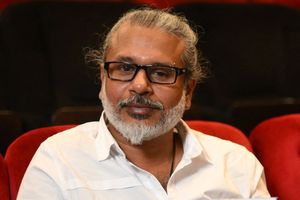None get to choose where they are born. Many try to steal the credit.” This is the intriguing line to Shehan Karunatilaka’s collection of quirky short stories titled—The Birth Lottery and Other Surprises.
Well, personally speaking, Shehan himself was the biggest surprise when I finally got to meet the Sri Lankan literary sensation at a recently concluded literature festival in Thiruvananthapuram. I had seen him earlier at the Jaipur Literary Festival (we were staying at the same hotel), and I would watch him with his statuesque wife and two young children, as they enjoyed breakfast, before leaving for the festival venue. But we didn’t speak. In Thiruvananthapuram, thanks to Kanishka Gupta, our shared literary agent, Shehan graciously presented three signed copies of his award-winning books, and totally overwhelmed me by his generous gesture. That other envious delegates tried to steal at least one of the books from me says a lot about the writer’s growing fan club. For all his fame and popularity (he won the Booker Prize in 2022), Shehan seems most unaffected by the adulation. At 48, he has the slightly worn appearance of a hippie-era musician looking for a gig. Unsurprisingly, he is, in fact, a gifted bass player with a rock band, owns a collection of guitars and admires The Police.
The Seven Moons of Maali Almeida, which won him the Booker, is described as a “metaphysical thriller, an afterlife noir” by Neil MacGregor, chair of judges, The Booker Prize 2022. It has received raves for its inventive narrative and whimsical prose. The protagonist, Maali Almeida, is described in three words—photographer, gambler, slut. The word slut appears quite frequently in the books and at one point, Janela Fernandes, a character from the short stories collection explains, “A slut is a woman with the morals of a man.”
Shehan’s skill at creating worlds within worlds and turning our world upside down makes him one of the hottest writers in publishing circles. I have been devouring his work ever since that meeting in Thiruvananthapuram, which saw a generous sprinkling of well-known writers, sipping drinks and discussing their own genius. Here was this guy, with eyes like burning coal, disheveled hair, an unruly beard, dressed in a nondescript hoodie, doing what good writers should—but rarely—do. He was casually walking around, informally chatting with all and sundry, wearing his fame lightly and with complete nonchalance. What’s more—he looked interested in other people and their stories! That’s a rarity in writers as a breed. “I can’t understand why humans destroy when they can create—such a waste,” Shehan writes. And then it makes you wonder about his penchant for teasing readers. Given that much of his writing reflects “the world’s dark heart”, is he having fun by making fun of us, his besotted readers?
I wish I had spent more time talking to Shehan, instead of wasting it on retired ambassadors and jaded bureaucrats peddling their latest, utterly boring tomes. Here is a startlingly original voice articulating deeply profound, very philosophical truths, particularly about the civil war in his country, but doing so adopting dark humour and subterfuge, woven into bizarre yet thought provoking scenarios that keep a reader begging for more! Shehan warns you: “Never [read] in sequence. I don’t with other people’s works. Why should anyone with mine?”


